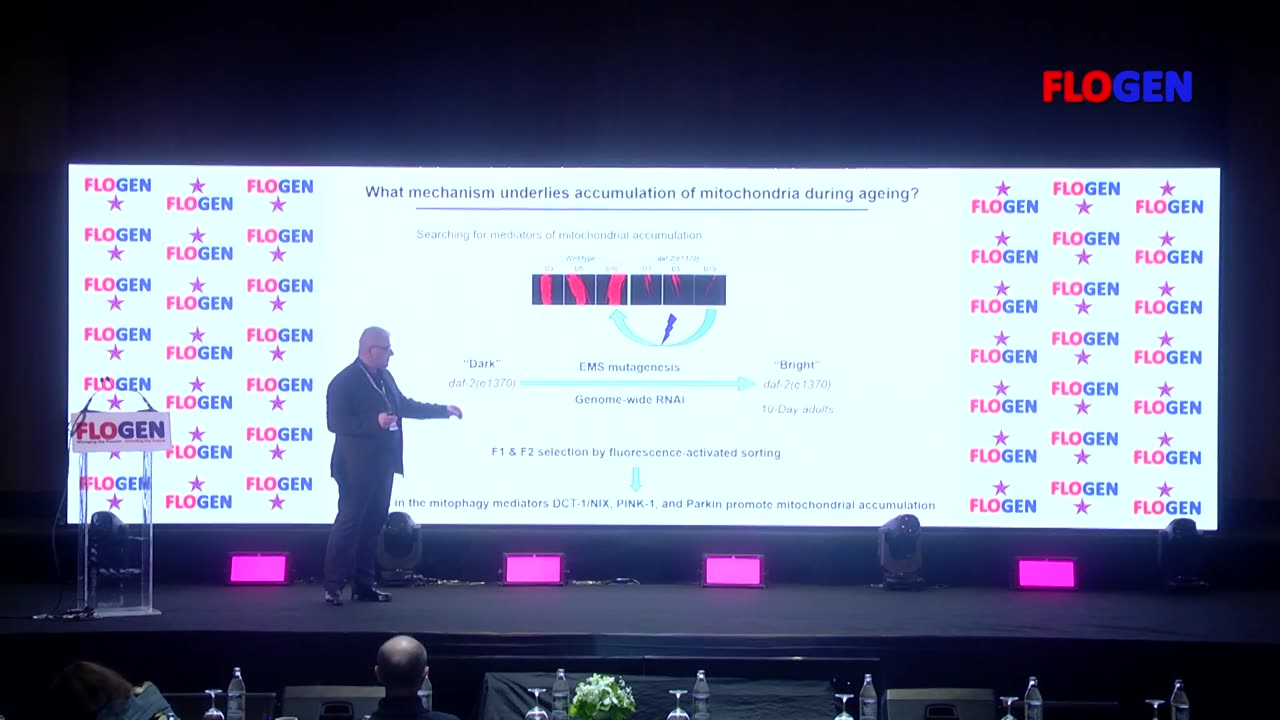Premium Only Content

Prof. Nektarios Tavernarakis @ FLOGEN SIPS 2022 Yoshikawa Intl. Symposium on Oxidative Stress
FLOGEN SIPS 2022: Yoshikawa International Symposium on Oxidative Stress for Sustainable Development of Human Beings (2nd international Symposium)
Presenter:
Prof. Nektarios Tavernarakis, University of Crete, Heraklion, Greece
Title:
Cellular energy homeostasis in neurodegeneration and ageing
Abstract
Ageing is driven by the inexorable and stochastic accumulation of damage in biomolecules vital for proper cellular function. Although this process is fundamentally haphazard and uncontrollable, senescent decline and ageing is broadly influenced by genetic and extrinsic factors. Numerous gene mutations and treatments have been shown to extend the lifespan of diverse organisms ranging from the unicellular Saccharomyces cerevisiae to primates. It is becoming increasingly apparent that most such interventions ultimately interface with cellular stress response mechanisms, suggesting that longevity is intimately related to the ability of the organism to effectively cope with both intrinsic and extrinsic stress. Key determinants of this capacity are the molecular mechanisms that link ageing to main stress response pathways, and mediate age-related changes in the effectiveness of the response to stress. How each pathway contributes to modulate the ageing process is not fully elucidated. A better understanding of the dynamics and reciprocal interplay between stress responses and ageing is critical for the development of novel therapeutic strategies that exploit endogenous stress combat pathways against age-associated pathologies. Mitochondria, the indispensable and highly dynamic, energy-generating organelles in all eukaryotic cells, play essential roles in fundamental cellular processes. Neuronal cells depend, perhaps more than any other cell type, on proper mitochondrial function. Mitochondrial impairment is a major hallmark of several age-related neurodegenerative pathologies, including Alzheimer’s disease. Interestingly, accumulation of damaged mitochondria has been observed in post-mortem brain of Alzheimer’s disease patients. Mitophagy is a selective type of autophagy mediating elimination of damaged mitochondria, and the major degradation pathway, by which cells regulate mitochondrial number in response to their metabolic state. However, little is known about the role of mitophagy in the pathogenesis of Alzheimer’s disease. Although disease-associated tau and amyloid β are known to deregulate mitochondrial function, it remains elusive whether they also directly influence the efficiency of mitophagy. To address this question, we developed an in vivo imaging system to monitor mitophagy in neurons. We demonstrated that neuronal mitophagy is impaired in C. elegans models of Alzheimer’s disease. Urolithin A- and nicotinamide mononucleotide-induced mitophagy ameliorates several pathological features of Alzheimer’s disease, including cognitive defects. Mitophagy stimulation restores memory impairment. Age-dependent decline of mitophagy both inhibits removal of dysfunctional or superfluous mitochondria and impairs mitochondrial biogenesis resulting in progressive mitochondrial accretion and consequently, deterioration of cell function. Our findings suggest that impaired removal of damaged mitochondria is a pivotal event in Alzheimer’s disease pathogenesis highlighting mitophagy as a potential therapeutic intervention.
-
 58:34
58:34
Rethinking the Dollar
16 hours agoTrump Faces 'Big Mess' Ahead | RTD News Update
2.17K3 -
 5:35
5:35
Dermatologist Dr. Dustin Portela
16 hours ago $0.01 earnedUnboxing Neutrogena PR Box: Skincare Products and Surprises!
2.97K1 -
 11:20
11:20
China Uncensored
16 hours agoCan the US Exploit a Rift Between China and Russia?
3.67K12 -
 2:08:48
2:08:48
TheSaltyCracker
11 hours agoLefty Grifters Go MAGA ReeEEeE Stream 12-22-24
194K618 -
 1:15:40
1:15:40
Man in America
14 hours agoThe DISTURBING Truth: How Seed Oils, the Vatican, and Procter & Gamble Are Connected w/ Dan Lyons
115K85 -
 6:46:07
6:46:07
Rance's Gaming Corner
16 hours agoTime for some RUMBLE FPS!! Get in here.. w/Fragniac
157K2 -
 1:30:48
1:30:48
Josh Pate's College Football Show
15 hours ago $10.21 earnedCFP Reaction Special | Early Quarterfinal Thoughts | Transfer Portal Intel | Fixing The Playoff
90K -
 23:55
23:55
CartierFamily
3 days agoElon & Vivek TRIGGER Congress as DOGE SHUTS DOWN Government
130K152 -
 5:43:44
5:43:44
Scammer Payback
2 days agoCalling Scammers Live
223K30 -
 18:38
18:38
VSiNLive
2 days agoProfessional Gambler Steve Fezzik LOVES this UNDERVALUED Point Spread!
160K20